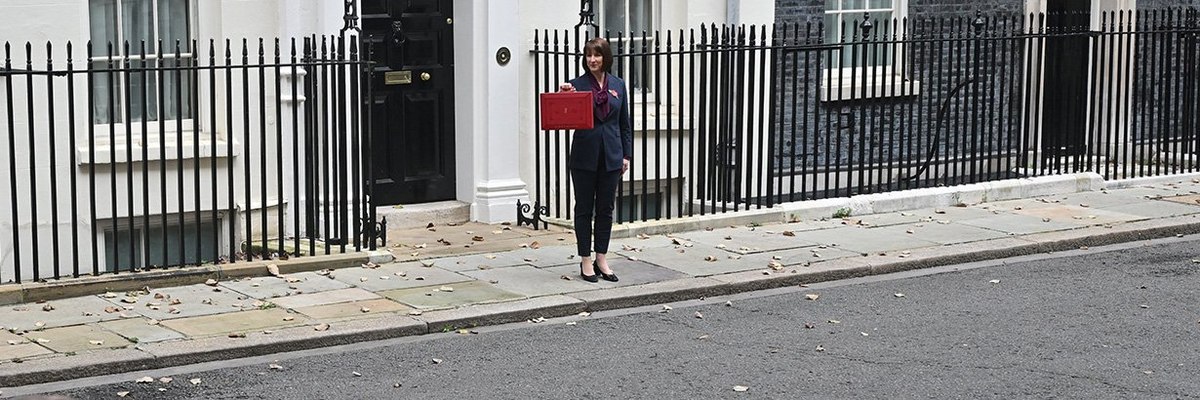Amidst poor ratings for the government on the economy, some proposed Budget measures appear popular
Key takeaways
- The public believe the UK economy is in a bad state, and that the government is handling it badly
- Of the measures mooted, leaked, and discussed in the build-up to the Budget, increasing taxes on gambling companies and high value homes poll well, along with removing VAT on energy bills and subsidising employment for young people
- Personal tax rises poll badly, but the public no longer expect Rachel Reeves to introduce them as part of the Budget
Britons think things are bad, and that the government is handling them badly
Our data shows that British adults generally believe the economy is in a poor state, and are highly critical of the government's handling of it. Approximately three quarters consider the British economy to be in a bad state (79%), while a similar number (77%) say the government is doing a bad job at managing the economy.
To what extent do the public blame Labour for the state of the economy?
When we asked those who say the economy is in a bad state to say why they think that is, "the impact of decisions made by the current Labour government" tops the list at 64% - noticeably higher than the number laying the blame at the Conservatives’ door (46%). (Note this is likely in part because people with more pro-government views previously answered that the economy is in a good or at least not-bad state, and therefore were not included in this follow-up question)
Four in ten of those who said they think the economy is in a bad state suggest Brexit is playing a significant role in the current state of affairs (43%), with fewer saying so of the impact of low productivity in British companies (26%), the Ukraine war (23%), international markets (16%) and US tariffs (15%).
The public does acknowledge the economic situation Rachel Reeves inherited, with 73% saying “the Chancellor inherited a poor economy from the last government” – but this includes 36% who follow that with the statement “but she has made things even worse” and another 28% who say “and nothing has really changed”. Just 9% followed up with “but she is gradually making things better”.
Labour has long since lost its lead on the economy
While Labour gained a lead over their Tory rivals on the economy following Liz Truss’s infamous mini budget, this was ceded once again in the aftermath of the general election. The very latest YouGov tracker data shows that it is once again the Conservatives that the public are most likely to say they trust most on the economy when asked to pick from a list of the main parties, with 20% choosing them compared to 12% who say Labour and the same number for Reform UK.
A separate recent YouGov survey looking at absolute trust levels (i.e. how much trust the public has in each separate party individually) shows Reform UK and the Conservatives vying for the top spot on 27% and 26% respectively, and Labour notably further behind on 19%.
What Britons want from the Budget and what they expect differ markedly
Our poll examined 13 different policies that have been floated, leaked or mooted as part of pre-Budget gossip.
Topping the list is increasing taxes on gambling companies, which 82% of Britons described as “the right thing to do”. Only three others are also supported by a majority of people: removing VAT from energy bills (76%), introducing new taxes on the most expensive houses (60%), and subsidising companies to offer jobs to young unemployed people (60%).
Measures that financially impact average citizens are far less popular. Very least popular is reducing the amount of money people can save in a Cash ISA every year, which just 9% think is the right thing to do.
Unsurprisingly, tax increases also prove unpopular: just 17% back increasing fuel duty, 19% support raising income tax by 2p but decreasing National Insurance by the same amount, and 20% say it would be right to raise income tax by 2p.
When asked what the Chancellor will or will not do in the Budget, the public's expectations differ significantly from their stated preferences. The top three measures the public think "probably will" happen are increasing fuel duty (58%), reducing the amount of money people can put into a Cash ISA (52%), and increasing taxes on gambling companies (51%).
By contrast, the most popular measure – removing VAT from energy bills – is the measure the public are least likely to think will happen, with only 8% saying it "probably will".
The public think tax increases are unfair, but more are willing to accept that they would be good for public services
The government has understandably backed down from increasing income taxes, with fully 66% of Britons suggesting they think that raising personal taxes is unfair – just 19% see such a move as fair.
However, either now or in the future, the government might have to reconsider this move, and will need to figure out the best way to frame the decision. Our data shows that 30% of Britons are willing to accept that raising personal taxes would be good for public services – and in particular this includes 62% of current Labour voters, and 34% of those who have abandoned the party since the 2024 general election.
Interested in taking YouGov surveys? What do you think about the government's handling of the economy, whether taxes need to increase, and everything else? Have your say, join the YouGov panel, and get paid to share your thoughts. Sign up here.
Interested in commissioning YouGov research? We connect in real-time with real people around the world to gather their thoughts, behaviours, and opinions, to ensure that our research data is powered by reality. Explore our survey services here.
Photo: Getty









